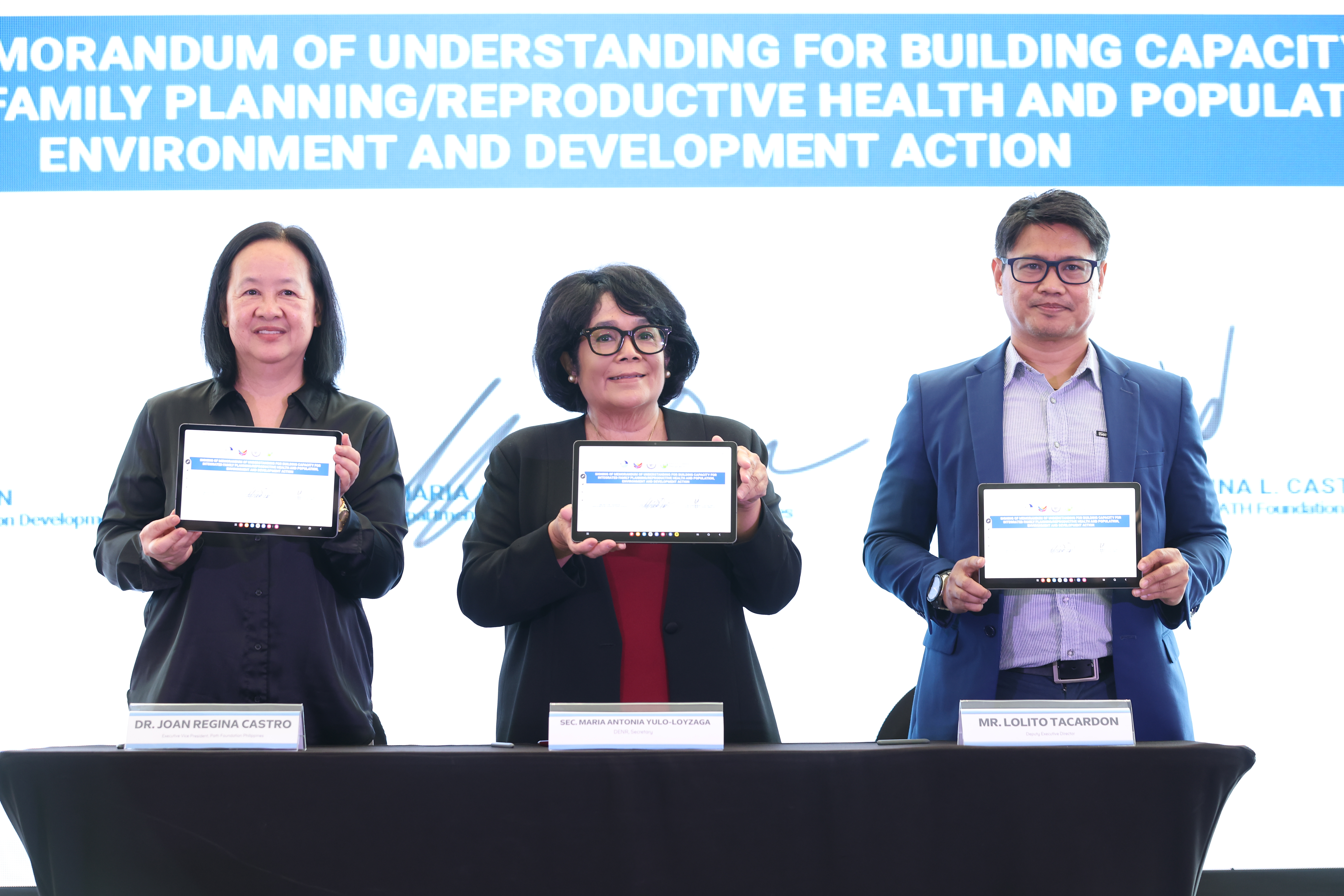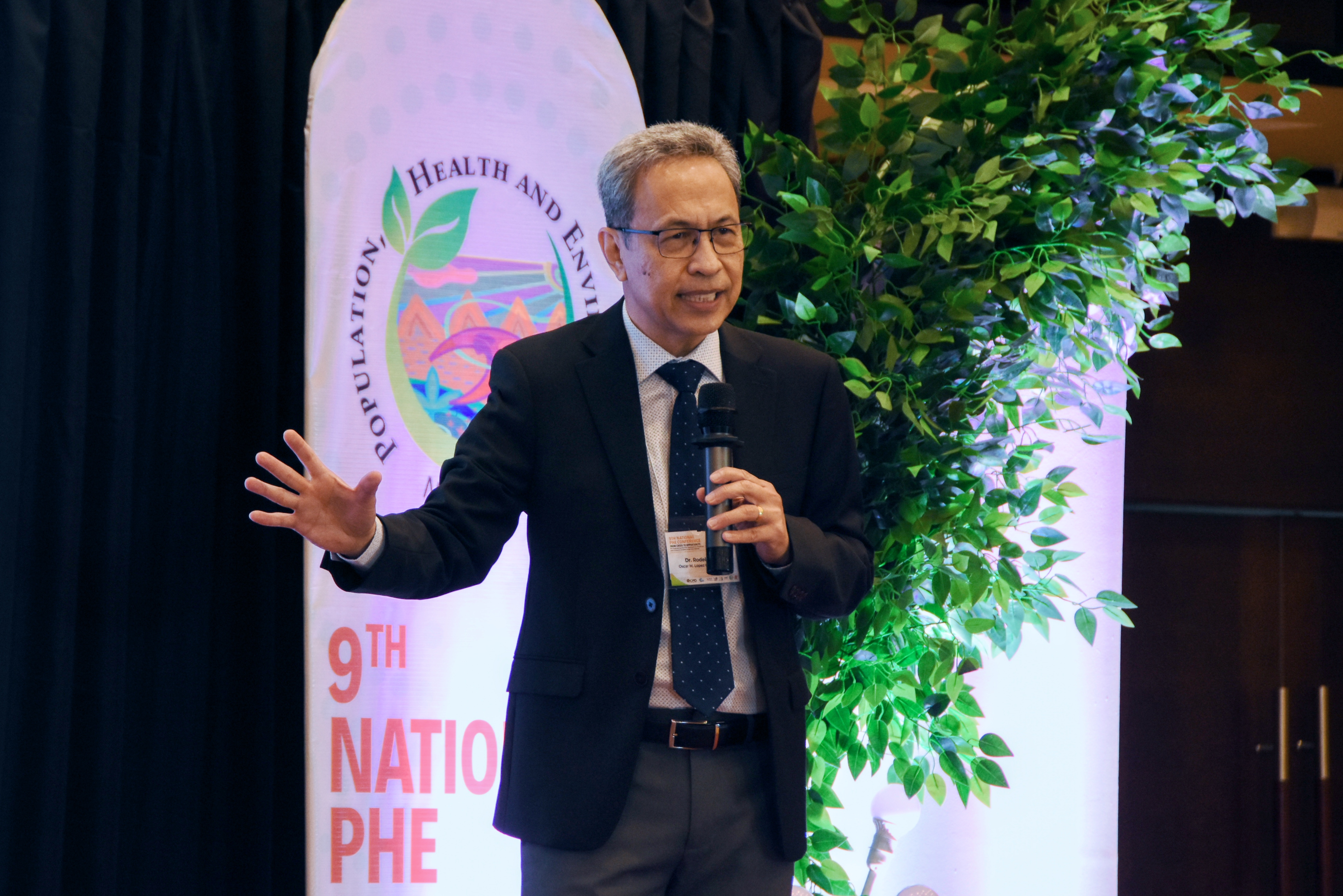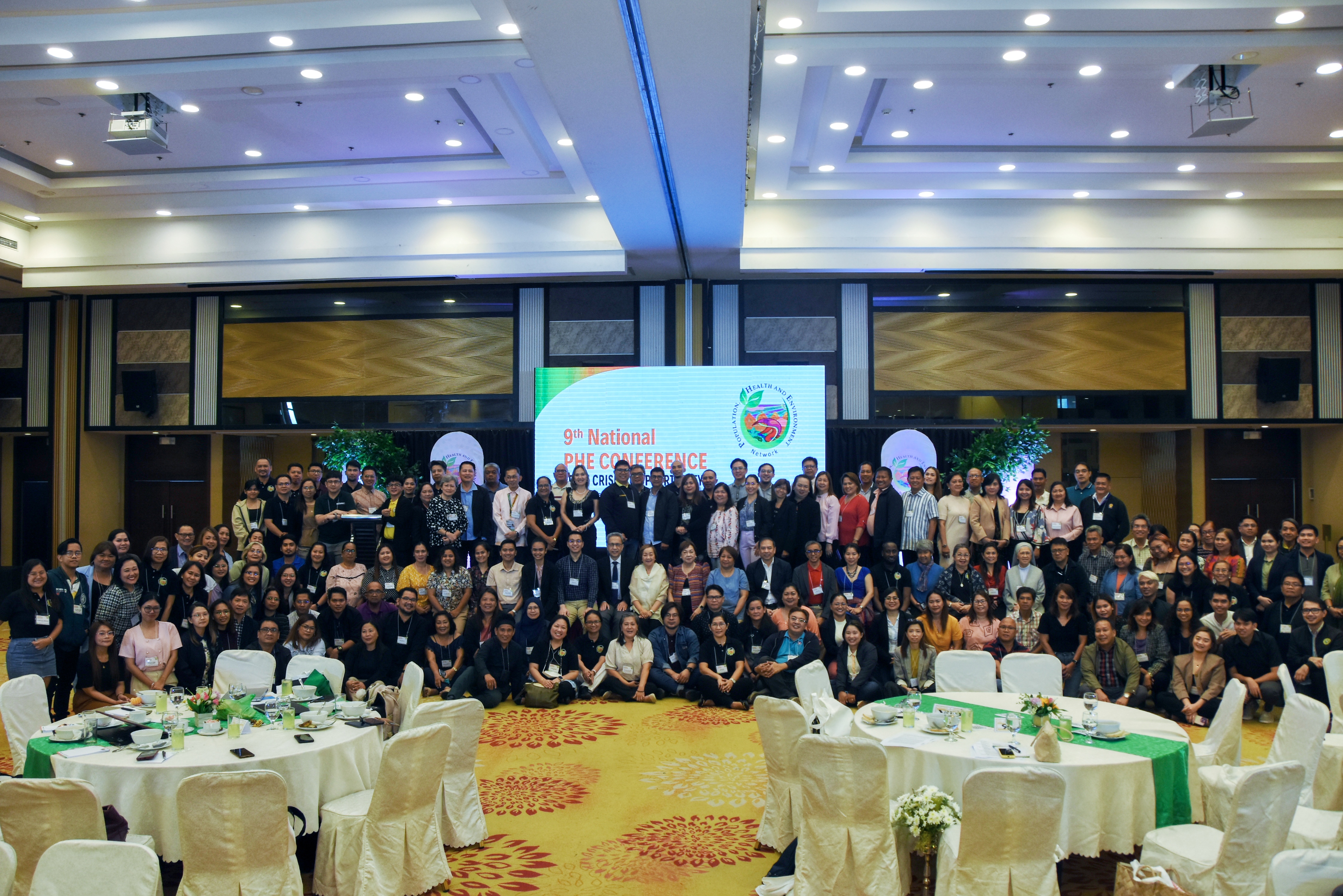PATH Foundation Philippines, Inc. (PFPI) signed a memorandum of understanding with the Commission on Population and Development (CPD) and the Department of Environment and Natural Resources (DENR) for the implementation of convergence activities of the three organizations under the BUILD Project. (L-R: PFPI Executive Vice President Dr. Joan Regina Castro, DENR Secretary Maria Antonia Yulo-Loyzaga and CPD Deputy Executive Director Lolito Tacardon.)
Every year on July 11th, World Population Day comes as an important reminder of the serious challenges surrounding global population dynamics. The theme “Embracing the power of inclusive data towards a resilient and equitable future for all” for 2024 emphasizes the critical role that reliable and inclusive data play in developing responsive development policies and programs.
This year’s celebration highlights the significance of a comprehensive, multidisciplinary framework of evidence-to-policy processes, with the goal of ensuring that policies and programs not only adhere to global principles of sexual and reproductive health and rights (SRHR) but also uphold the dignity and well-being of all individuals.
Beyond numbers
Inclusive data is more than simply numbers; it captures the diverse realities of people’s lives across regions, communities and demographics. Reliable data collection must take into account not only the multiple variables of population but also the underlying socio-economic, political, cultural and environmental nuances that influence these data. This comprehensive approach is critical for identifying and meeting the particular requirements of various population groups, ensuring that no one is left behind.
Inclusive data is fundamental for evidence-informed decision-making, enabling the design and implementation of policies and programs that are both effective and equitable. Without comprehensive and reliable data, efforts toward addressing population-related concerns may become misguided, aggravating rather than alleviating inequalities.
Comprehensive frameworks needed
To address the complex and interconnected challenges of population and development, more comprehensive, multidisciplinary frameworks are needed. Integrating data from several sectors, such as health, including family planning/reproductive health, environment and food security, is critical for developing holistic solutions.
Health
Connecting demographic and health data helps recognize and solve inequities in healthcare access, maternal and child health, and disease prevalence. Understanding the relationship between population density and infectious disease spread, for instance, can help guide targeted delivery of vaccines and family planning services.
Conservation and climate change
Population dynamics exert a substantial impact on both environmental sustainability and climate resilience. Data on population growth, migration patterns and urbanization trends can help to guide environmental conservation and climate adaptation initiatives. For example, areas with high population growth and migration may confront increased demand for natural resources, exacerbating the consequences of climate change on communities that rely on them. This scenario demands land use planning and resource management strategies that consider population dimensions
Food Security
Demographic data is critical to ensuring food security since it helps in the projection of future food demand and the identification of food insecurity- or malnutrition-prone populations. Integrating statistics on population growth and agricultural and fisheries output can help policymakers improve food production, distribution, and access. Food security is also linked to environmental conservation and climate change, as ecosystem health affects food system productivity and resilience.
Linking population and human and ecological health
The interrelationship between population dynamics and human and ecological health has become more evident over the years, especially with the challenges of climate change. Population growth, urbanization and migration pose direct impacts on the states of ecological integrity, public health and overall community resilience. Recognizing these relationships is critical for establishing sustainable and equitable solutions. But the more important step is to undertake actual efforts that address these relationships and the associated challenges.
Human health
Rapid population growth and urbanization can put an added strain on healthcare systems, exacerbating gaps in access to health services and increasing vulnerability to health crises. Inclusive data assists in identifying these difficulties and informing policies aimed at strengthening healthcare infrastructure, improving disease surveillance, and promoting health equity.
Ecological health
Population dynamics influence land and natural resource consumption. In order to protect and conserve ecosystems, mitigate and adapt to climate change, and ensure the availability of natural resources for future generations, sustainable population management based on reliable data is crucial. For instance, in upland ecosystems, rapid population growth and migration have resulted in extensive forest loss as land is cleared for agriculture and human settlements. Reliable demographic and environmental data can help policymakers reconcile human demands with conservation efforts, promoting approaches like agroforestry that safeguard biodiversity while also sustaining local livelihoods.
Resilience
Communities that recognize and manage the interconnection between population dynamics, their health and the environment are better able to cope with and recover from shocks such as natural disasters and the resulting economic downturns. Inclusive data contributes to resilience development by offering richer insights about vulnerabilities and capacities of humans and ecosystems, which better guide investments in infrastructure and social services.
From data to action: Implementing holistic interventions
Recognizing the interconnectivity of population and sectoral data is an important starting point, but it is not enough. Interventions must be developed and put into action in order to successfully address these linked concerns. This necessitates holistic approaches, systems thinking, and cross-sectoral collaboration to ensure that policies and programs are integrated, comprehensive, and responsive to the needs of various groups.
Integrated policy and program development
Policymakers must adopt an integrated approach to policy development, considering the interdependencies between population dynamics, health, the environment and other development sectors and concerns. For example, urban planning should incorporate considerations of population growth and distribution projections in housing and transportation programs.
Multisectoral collaboration
Successful design and implementation of policies and programs require collaboration across sectors, involving stakeholders from government, civil society, academia and the private sector. This collaborative approach guarantees that different viewpoints and expertise are considered, resulting in more inclusive and innovative solutions.
Community engagement
Inclusive data collection and utilization should involve communities, ensuring that their knowledge and perspectives are reflected in policies and programs. Engaging communities in the data collection process improves accuracy and relevance while also instilling a sense of ownership and accountability.
Monitoring, evaluation and communication
Regular monitoring and evaluation of policies and programs is vital in order to gauge their efficacy and make the necessary adjustments. Inclusive data allows for the tracking of progress and detection of emerging challenges, ensuring that interventions stay responsive and effective. Communities should also be involved in this process to ensure ownership and accountability. Further, communicating the process and results of monitoring and evaluation exercises with communities fosters trust and drives increased participation.
Integrating forward
As we commemorate World Population Day 2024, it is critical to acknowledge the transformative power of inclusive data. By adopting comprehensive, interdisciplinary frameworks for evidence-informed policymaking and programming, we can create interventions that address the interconnected concerns of population dynamics, health, environment and resilience.
Inclusive data not only improves our understanding of these complicated issues, but it also enables us to take effective action. By combining demographic data with other development data, we can gain a more comprehensive grasp of the challenges and opportunities at hand.
Embracing the power of inclusive data is more than just better data collection and analysis; it is also about cultivating a culture of convergence and accountability. By collaborating and harnessing the insights afforded by inclusive data, we can create a resilient and equitable future for all, ensuring that every individual’s dignity and well-being are upheld and that no one falls behind. ###





